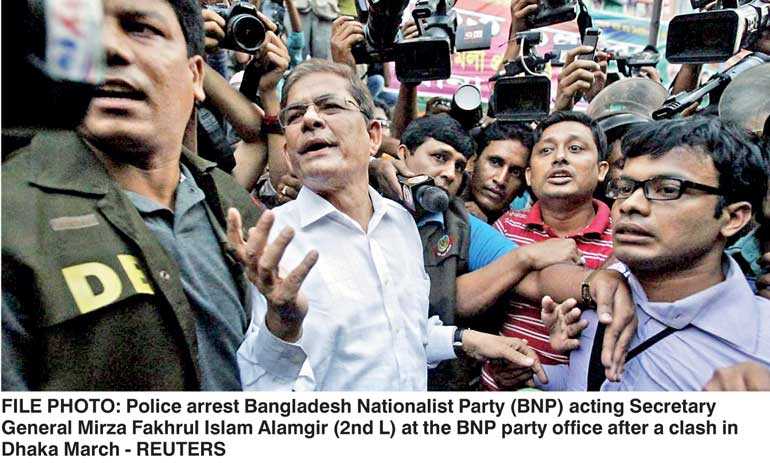Wednesday Feb 25, 2026
Wednesday Feb 25, 2026
Monday, 1 October 2018 00:44 - - {{hitsCtrl.values.hits}}

Dhaka (Reuters): Bangladesh’s main opposition political group, the Bangladesh Nationalist Party (BNP), “strongly” wants to take part in national elections due in three months, the party’s secretary general told Reuters on Saturday.
The BNP will hold a public meeting in the capital Dhaka on Sunday and present demands that include the release of its jailed leader Khaleda Zia, installing a neutral caretaker government, and involving the army to oversee the December elections, BNP Secretary General Mirza Fakhrul Islam Alamgir said.
“As a large party, we have all the preparations for participating in (a) coming election, but for that we need a level playing field, which is not there,” he said. “We are demanding a neutral government as it is our experience that with the ruling party there cannot be a free and fair election.” The interview marks the first time the BNP has explicitly stated its plans for the national election, during which Prime Minister Sheikh Hasina’s Awami League - accused of increasingly authoritarian rule - is expected to face a tough fight. Elections in Bangladesh, which won independence in 1971, are usually marked by violence and protests, and the national polls in December are expected to be no different, as several members of the BNP including its leader are in jail. The BNP boycotted the 2014 polls after Hasina’s governing Awami League, which has been in power since 2009, declined demands to put in place a nonpartisan caretaker government.
Khaleda, a two-term prime minister with whom Hasina has a long and bitter rivalry, was jailed in February for five years on corruption charges that she alleged were part of a plot to hamper her political career. Her son Tarique Rahman was also convicted and sentenced to a 10-year prison term, though he now lives in exile in London.
Dozens of other BNP members have also been sent to prison in recent years on what the party alleges were false charges. Alamgir said a decision on who would run for Prime Minister would be taken in consultation with Khaleda and Rahman.
While Hasina has been lauded internationally for providing shelter for nearly a million Rohingya Muslims who have fled violence and persecution in Myanmar, she is facing increasing criticism over free speech.
Security forces fired tear gas and rubber bullets at students who took to the streets last month to demand better road safety. Several people, including students and a senior photographer Shahidul Alam, were put behind bars following the protests, sparking calls from international rights activists for their release.
Security forces have also been accused of extrajudicial killings in a war on drugs declared by Hasina, under which more than 200 people have been killed since July. Most recently, a new digital security law passed by Parliament last week has come under intense criticism from journalists who say it would cripple media freedom.
The government has said its crackdown during the student protests was aimed at BNP workers who tried to provoke the students, and has denied allegations of extrajudicial killings.
It also dismisses accusations of jailing BNP workers on false charges, and Hasina has said there are no plans to modify the new digital security law.